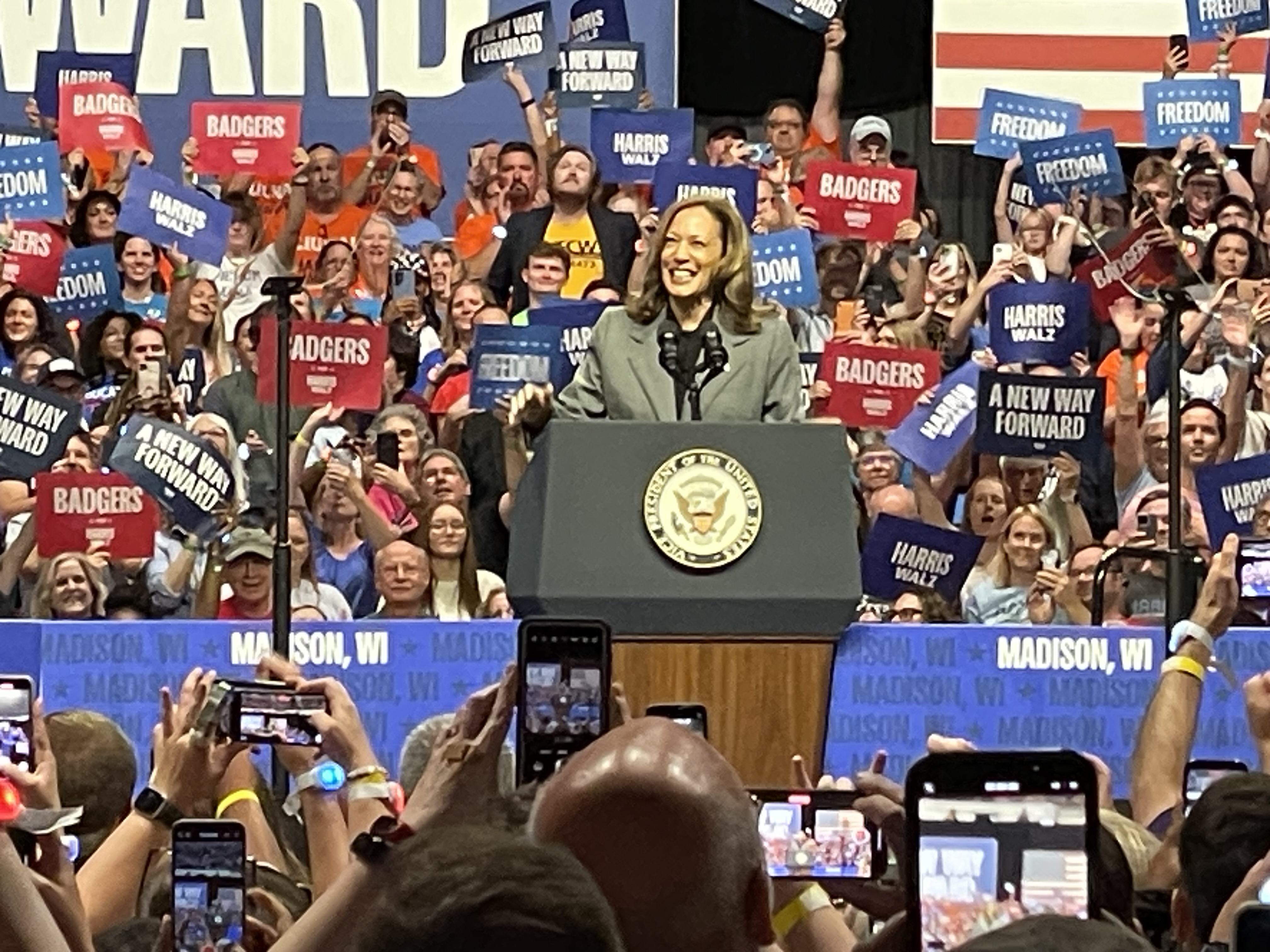
- Details
- By Levi Rickert
Native Vote 2024. Vice President and Democratic presidential candidate Kamala Harris made her fourth trip to Wisconsin, a key battleground state in the 2024 U.S. presidential election, on Friday, Sep. 20.
The Madison rally was held at the Alliant Energy Center, and according to Harris campaign officials, “with over 10,500 attendees.”
The capacity crowd heard from Wisconsin Democratic chair Ben Wikler, Madison Mayor Satya Rhodes-Conway, Congressman Mark Pocan, Senator Tammy Baldwin, and Governor Tony Evers.
In between speakers, the DJ played music that kept the crowd excited, some danced to pass the time. Attendees were given multi-colored lighted wristbands that lit up the arena. The combination of music and lights gave the rally a party atmosphere.
Before Harris took the stage, she was endorsed by Teamsters Joint Council 39 and introduced by their president, Bill Carroll. Early in the week, the Teamsters made news electing not to endorse either candidate for U.S. president. However, local Teamster councils that collectively number over one million have endorsed the Harris-Walz ticket.
Vice President Harris thanked Madison’s mayor for taking her to visit her childhood home during a recent trip to Madison. Harris lived in Madison when she was 5 years old, and her parents worked at UW-Madison.
Harris spoke to her supporters about her debate performance against her opponent, former President Donald Trump. She said, “it was fun.”
Harris said she talked to Americans about her plan to lower the cost of groceries and drugs, supporting small businesses, and protecting reproductive freedoms, while Trump uses his “old, tired playbook.”
“He has no plan of how he would address the needs of the American people,” Harris said. “It’s time to turn the page. America is ready to chart a new way forward. We are tired of all the division and hate what they are pushing.”
Harris emphasized the support her campaign receives from Democrats, Republicans, and Independents as she makes her case to win the White House.
The vice president tours her “opportunity economy” plan that would help Americans own a home, build wealth, and start a business if she is elected to office.
Her goal is to build 3 million new homes by the end of her first term as president. She has plans to support new homebuyers with $25,000 in down payment assistance, take on corporate price gouging, and increase child tax credits.
She said Trump plans to cut Social Security, increase foreign tariffs, and end the Affordable Care Act (ACA).
“Trump’s tariffs would cost American families $4,000 per year,” Harris said. “He has a concept of a plan,” to replace the ACA.
Harris reminded supporters of when health insurance companies could deny healthcare coverage to Americans with preexisting conditions, which ended with the passage of the ACA.
“We are not going back,” Harris said.
With early voting starting in a handful of states last week, Harris asked her supporters to go out to “energize, organize, and mobilize” Wisconsin voters.
“The election is already here,” she said. “Remind everyone: your vote is your voice. And your voice is your power. Never let anyone take your power from you.”
Since the Madison rally, Harris has challenged Trump to a CNN debate on October 23, which would be the second presidential debate between Harris and Trump. Trump has yet to agree to participate in the debate.
More Stories Like This
Native News Weekly (August 25, 2024): D.C. BriefsNative News Weekly (February 22, 2026): D.C. Briefs
NCAI Releases Sttatement on the Passing of Rev. Jesse Jackson
Colusa Indian Energy Participates in Port of Quincy Town Hall on Columbia Basin Power Project
Q&A: Jingle Dress Dancer Answered Call to Ceremony in Face of ICE Violence
Help us defend tribal sovereignty.
At Native News Online, our mission is rooted in telling the stories that strengthen sovereignty and uplift Indigenous voices — not just at year’s end, but every single day.
Because of your generosity last year, we were able to keep our reporters on the ground in tribal communities, at national gatherings and in the halls of Congress — covering the issues that matter most to Indian Country: sovereignty, culture, education, health and economic opportunity.
That support sustained us through a tough year in 2025. Now, as we look to the year ahead, we need your help right now to ensure warrior journalism remains strong — reporting that defends tribal sovereignty, amplifies Native truth, and holds power accountable.
 The stakes couldn't be higher. Your support keeps Native voices heard, Native stories told and Native sovereignty defended.
The stakes couldn't be higher. Your support keeps Native voices heard, Native stories told and Native sovereignty defended.
Stand with Warrior Journalism today.
Levi Rickert (Potawatomi), Editor & Publisher


